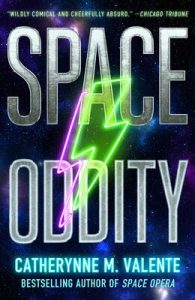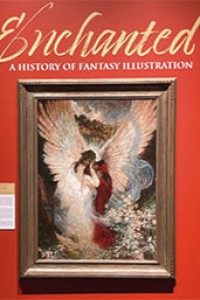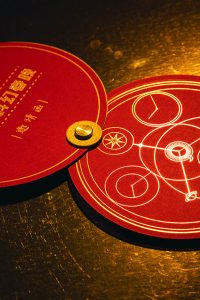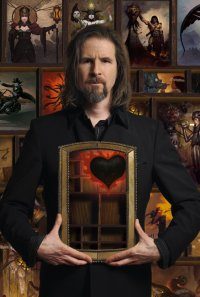Catherynne M. Valente: Get to the Future

CATHERYNNE M. VALENTE was born May 5, 1979 in Seattle WA, and grew up moving between her parents in Seattle and Sacramento CA. She attended high school in Davis CA, graduating at age 15 and attending UC San Diego, where she took a degree in Classical Studies. She attended grad school at Cal Poly San Luis Obispo, but quit to move overseas. She lived near Yokohama, Japan for just over two years, and in 2005 returned to the US and lived briefly in Virginia before moving to Cleveland OH. She settled on Peaks Island ME in 2005, and lives there with her son.
The Labyrinth, her surreal first novel, appeared in 2004, followed by Yume no Hon: The Book of Dreams (2005) and The Grass-Cutting Sword (2006). Those books, along with novella Under in the Mere (2009), were collected in 2011 omnibus Myths of Origin.
Her Mythopoeic Award-winning Orphan’s Tales duology, In the Night Garden (2006) and In the Cities of Coin and Spice (2007), brought her to the attention of a wider audience; the first volume won the Tiptree and was a World Fantasy Award finalist. The two books in the historical fantasy Dirge for Prester John series are The Habitation of the Blessed (2010) and The Folded World (2011).
Children’s book The Girl Who Circumnavigated Fairyland in a Ship of Her Own Making (which was first a book-within-a-book mentioned in Palimpsest) was serialized online in 2009, and won the Andre Norton Award; it appeared in print in 2012. Sequels include The Girl Who Fell Beneath Fairyland and Led the Revels There (2012), The Girl Who Soared Over Fairyland and Cut the Moon in Two (2013), The Boy Who Lost Fairyland (2011), The Girl Who Raced Fairyland All the Way Home (2016), and related short fiction.
Her standalone books include Hugo and Mythopoeic Award finalist Palimpsest (2009), Deathless (2011), Radiance (2015), The Refrigerator Monologues (2017), The Glass Town Game (2017), and Osmo Unknown and the Eightpenny Woods (2022).
Her Hugo Award-nominated humorous SF novel Space Opera (2018) has a new sequel, Space Oddity (2024).
Valente’s short stories have appeared in various literary and genre magazines and have been reprinted in Year’s Best anthologies and published as standalone books. ‘‘A Buyer’s Guide to Maps of Antarctica’’ (2008) was a World Fantasy Award finalist, and novella Silently and Very Fast (2011) was a Hugo, Sturgeon, World Fantasy, and Nebula Award finalist. ‘‘Fade to White’’ (2012) was a Hugo and Nebula Award nominee, and Six-Gun Snow White (2013) was a Hugo, World Fantasy, and Nebula Award finalist. The Past Is Red (2021), ‘‘L’Esprit de L’Escalier’’ (2021), ‘‘The Sin of America’’ (2021), and ‘‘The Difference Between Love and Time’’ (2022) were all Hugo Award nominees. Other notable short works include Speak Easy (2015), Temnaya and the House of Books (2016), and Comfort Me with Apples (2021). Her collections include A Guide to Folktales in Fragile Dialects (2008) Ventriloquism (2010), The Melancholy of Mechagirl (2013), The Bread We Eat in Dreams (2013), The Future Is Blue (2018), and The Best of Catherynne M. Valente: Volume One (2023).
Valente was first published as a poet. Notable works include chapbook Music of a Proto-Suicide (2004), Oracles: A Pilgrimage (2005), Apocrypha (2005), and The Descent of Inanna (2006). She won a Rhysling Award for best long poem with ‘‘The Seven Devils of Central California’’ (2007). She edited an issue of poetry journal Eye to the Telescope in 2013. She has also published and presented various critical papers, mostly about feminism, mythology, and literature. She’s written tie-in work for properties including Mass Effect and Minecraft.
Valente helped run the SF Squeecast podcast, twice winner of the Hugo Award for Best Fancast, and was an editor at Apex Magazine, earning a Hugo Award nomination in 2012. She also edited The Book of Apex: Volume 3 of Apex Magazine (2013) and Nebula Awards Showcase 55 (2021).
Excerpt from the interview:
 “I knew the Douglas Adams comparisons were going to happen with Space Opera. When you have Brits in space, you’re already walking a very dangerous line, because Adams is so hyperbolically fantastic, and you’re never going to top that, but you’re going to get compared to it. I had to sit back and think, ‘I really like the way this is coming out, but am I prepared?’ As John Scalzi famously said, ‘The Hitchhiker’s Guide was an extinction-level event for science fiction comedy.’ It set the new bar of, ‘You must be this good to ride this ride.’ It’s a high bar. In some ways, that took pressure off for me, because was I going to write the best science fiction comedy ever? Nope, definitely not. But I can shoot for the bronze. It felt a little safer that way – I didn’t have to put that pressure on myself. In the second volume, there is a cameo by a character named Douglas in his honor.
“I knew the Douglas Adams comparisons were going to happen with Space Opera. When you have Brits in space, you’re already walking a very dangerous line, because Adams is so hyperbolically fantastic, and you’re never going to top that, but you’re going to get compared to it. I had to sit back and think, ‘I really like the way this is coming out, but am I prepared?’ As John Scalzi famously said, ‘The Hitchhiker’s Guide was an extinction-level event for science fiction comedy.’ It set the new bar of, ‘You must be this good to ride this ride.’ It’s a high bar. In some ways, that took pressure off for me, because was I going to write the best science fiction comedy ever? Nope, definitely not. But I can shoot for the bronze. It felt a little safer that way – I didn’t have to put that pressure on myself. In the second volume, there is a cameo by a character named Douglas in his honor.
“It was such a silly concept, anyway, doing Eurovision in space – the way it came about was absurd. It’s literally from Twitter. Charles Tan, who is a fan in the Philippines, messaged me while I was livetweeting Eurovision and said, ‘You should write a SF/F Eurovision.’ I was like, ‘Ha ha, that would be cool.’ Editor Navah Wolfe DM’d me five minutes later and said, ‘I’ll buy that book right now.’ The thing is, that used to happen on Twitter, and will probably never happen again. It truly was a magical moment. It meant I had no idea what I was going to write when I sat down to do it. I knew I wanted to write about a British band for a few reasons: I’ve lived there, so I felt like I could handle depicting something set in the UK, and since it’s based on Eurovision, you can’t have Americans. Also, at the time time, I thought it would be funny, because the Brits never win Eurovision, and everyone gives them zero points – it’s like a running joke. Of course, since then, the UK came in second with a song called ‘Space Man’, because the universe wants me to be happy. The UK even hosted it! That’s the problem with near-future sci-fi – as soon as you write it, the world changes.
“I felt like what I could do was get my gross American feelings all over that aesthetic, because I adore Hitchhiker’s Guide from top to bottom, but it’s not super concerned with big, sincere emotions – that’s not really the point of it, but that is the point of a lot of what I write. What I enjoyed about Space Opera was being able to go back and forth from goofy comedy and puns and having Clippy be a character to things that were really meaningful and important and about politics and where the world was headed. That’s what Eurovision is, and does: It combines garbage pop music with the most beautiful things you’ve ever heard, and has this very dark political core, as it’s been going on since 1956 – it’s been through a lot in Europe. The book was really difficult to write, because I’d never written something where comedy is the top-level genre before. I’d written comedic scenes in dramatic novels, but nothing where you’d call it a comedy. So it was a real challenge but I loved doing it, and I knew that I was going to want to do a sequel.
“It’s called Space Oddity and it’s about the discovery of the next plausibly sentient species, which is naturally stumbled upon by Decibel Jones, the protagonist from the first book. That poor glam-rock man who hates working a job has to manage another species’ entrance into galactic culture.
“There’s a new species and the new species was discovered very quickly after the end of the first book, so no one’s really prepared to go through all of this again, and it gets very messy. That’s what was going on with Eurovision, though, with it being canceled for COVID and then Russia being expelled for the Ukraine invasion – there’s been a lot going on with Eurovision and it’s gotten very messy. There are a lot of themes of both of those big events floating through the book without retelling either of those events. And, of course, it’s about how Earth deals with suddenly living in the great science fiction future.
“I always do too much – I can’t stop doing too much, but it’s a different too much now. That’s part of it, though – if you weren’t a big Eurovision fan, it might not have been clear. There were some reviews that understood the reason parts of Space Opera are so over the top, and the sentences are long and all that, is because Eurovision is also over the top and goes on too long. A lot of its charm comes from the fact that it really shouldn’t be a pop culture phenomenon at all, given the actual content. The language is really different from my other books, and that’s part of why it was difficult, because I do care so much about how things sound and the language that’s used. But instead of just asking, ‘Is this the right word? Is it the prettiest word? Is it the one that moves a character along? Is it one that moves the plot along?’ I also had to ask, ‘Is it the funniest word?’ There are lots of conversations about what’s the funniest fruit, and that sort of thing. It’s a strange new style for me – making puns about pop music is certainly not what I’m known for, but it was so much fun. I have notebooks of band names and song names and everything else. It’s delightful to have a more casual and contemporary feel to things.
“I was four months pregnant when we had the Space Opera launch party, and my son was 16 months old when lockdown started, so I went straight from having a little baby into lockdown, and having a little baby is a lockdown of a sort anyway. It was like four years for me of not leaving the house or being able to go anywhere. It was incredibly difficult, not just because I had this little child, and there was no day care – there was just no help. You couldn’t have a babysitter, so it was 24/7, and he wasn’t sleeping through the night at that point. There were many points where I was the living embodiment of that meme where Elmo is on fire. Just on fire, all the time.
“The experience was so incredibly isolating. On top of that, a big difficulty for me as writer was, there was no input to make art out of. I was just looking at the same walls in my house, not experiencing new things or listening to the ways humans interact or anything that inspires me and brings new ideas along. Suddenly, everyone was in the white room with no details. I had projects that I had already been working on, but new ideas were very difficult to come by because there was just nothing but my house. We will probably see a lot of books about that thing in the next ten years, because everybody went through it and experienced it in a different way. We were on this island, too, so we couldn’t even get food delivery.
“There were a lot of these circuits of people taking long walks on the island, and they’d stand away from the porch and you might be able to talk. But because it’s just a small community, there was definitely a crucible element early on, where everyone was locked in their homes and if you saw anybody you didn’t know, people were freaking out about them on Nextdoor. It was very stressful and, of course, everyone had to take the ferry, so you were gonna get COVID on the ferry, basically. It was a vector for everybody to get what everybody else had. It was such a strange and odd time, and I wrote the first draft of Space Oddity then. To be quite frank, the only reason I was able to finish it was that I got COVID, and I was in quarantine, and my son didn’t have it, so my husband took care of our son and I was alone for two weeks to finish the book. It was a weird way to write a book, and also I was delirious most of the time, so in that first draft we’re just lucky I was writing in English or paragraphs or anything at all.
“I would have to erase whole chapters: ‘You didn’t make a joke, you were just sad.’ It was a lot. But when people read it, they’ll see that COVID is directly discussed in the first chapter, and folded into this vaguely alternate near-future history. It is what it is – something the whole world went through together, and though everybody experienced it differently, we all had some isolation.
“I don’t think there’s any good age to have been during that time. I have a niece and nephew who were teenagers, and it was awful for them. My son didn’t have a playdate until he was three. They missed so many very crucial social and language developmental stages. People who didn’t have little kids might not realize, but the masks mean they couldn’t see anybody’s mouth, so all the kids had speech delays, because they didn’t get the same social interaction of hearing lots of people talk, and then everyone had their mouths covered up so they couldn’t see their lips move to make those sounds. Yet we’re supposed to move past it and never talk about it.
“The biggest thing that changed between the draft of Space Oddity I wrote during COVID and what’s actually going to be published is, during COVID I felt, ‘Well, COVID is the only thing this book can be about. Eurovision’s been canceled for the first time ever – that’s what it has to be about.’ Then, as time went on, other things happened and it evolved from being just that sort of story. The new species in question doesn’t actually experience emotion at all, the way anybody else does, and that is where the COVID stuff ends up – that isolation of not being able to connect with other people, and how that creates a culture and a civilization. Can a whole civilization have depression? I wonder why I’d be asking that question?
Interview design by Francesca Myman
Read the full interview in the September 2024 issue of Locus.
 While you are here, please take a moment to support Locus with a one-time or recurring donation. We rely on reader donations to keep the magazine and site going, and would like to keep the site paywall free, but WE NEED YOUR FINANCIAL SUPPORT to continue quality coverage of the science fiction and fantasy field.
While you are here, please take a moment to support Locus with a one-time or recurring donation. We rely on reader donations to keep the magazine and site going, and would like to keep the site paywall free, but WE NEED YOUR FINANCIAL SUPPORT to continue quality coverage of the science fiction and fantasy field.
©Locus Magazine. Copyrighted material may not be republished without permission of LSFF.








There is no future; history is a tissue of unlikely accidents, and SF writers’ predictions are notoriously bad.